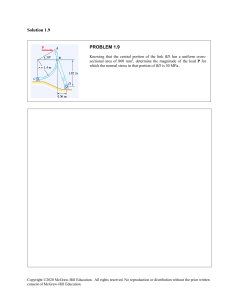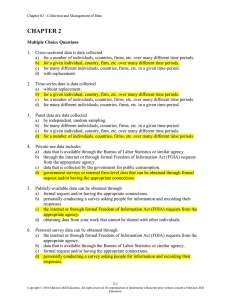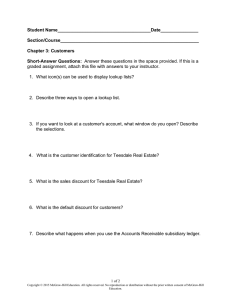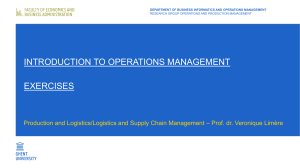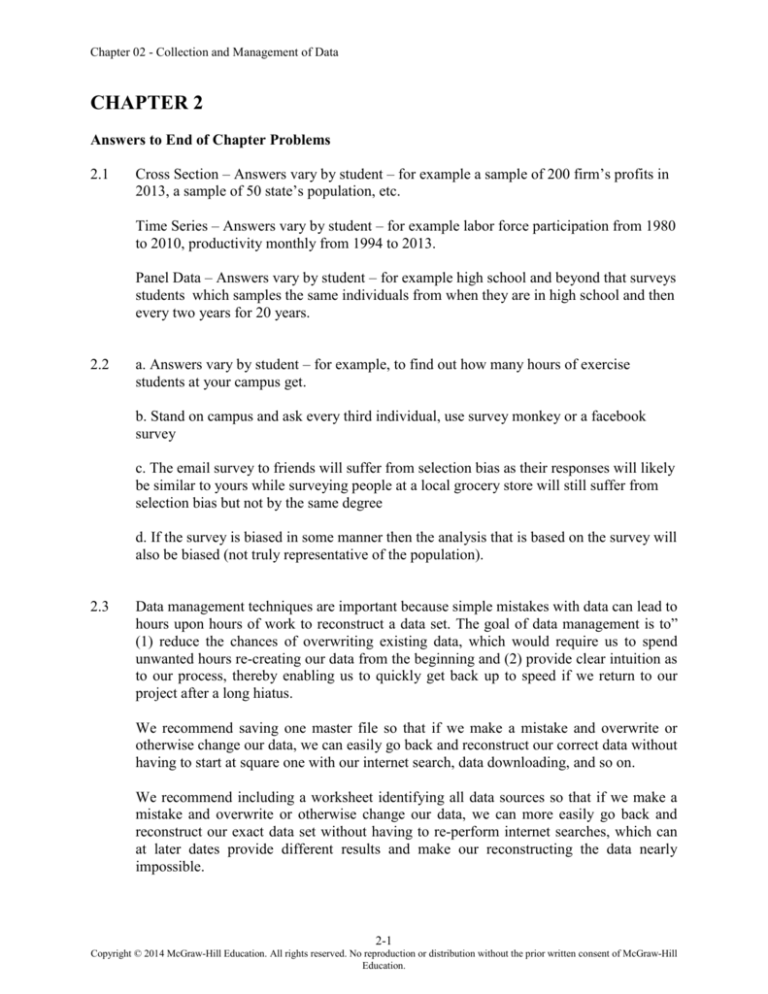
Chapter 02 - Collection and Management of Data
CHAPTER 2
Answers to End of Chapter Problems
2.1
Cross Section – Answers vary by student – for example a sample of 200 firm’s profits in
2013, a sample of 50 state’s population, etc.
Time Series – Answers vary by student – for example labor force participation from 1980
to 2010, productivity monthly from 1994 to 2013.
Panel Data – Answers vary by student – for example high school and beyond that surveys
students which samples the same individuals from when they are in high school and then
every two years for 20 years.
2.2
a. Answers vary by student – for example, to find out how many hours of exercise
students at your campus get.
b. Stand on campus and ask every third individual, use survey monkey or a facebook
survey
c. The email survey to friends will suffer from selection bias as their responses will likely
be similar to yours while surveying people at a local grocery store will still suffer from
selection bias but not by the same degree
d. If the survey is biased in some manner then the analysis that is based on the survey will
also be biased (not truly representative of the population).
2.3
Data management techniques are important because simple mistakes with data can lead to
hours upon hours of work to reconstruct a data set. The goal of data management is to”
(1) reduce the chances of overwriting existing data, which would require us to spend
unwanted hours re-creating our data from the beginning and (2) provide clear intuition as
to our process, thereby enabling us to quickly get back up to speed if we return to our
project after a long hiatus.
We recommend saving one master file so that if we make a mistake and overwrite or
otherwise change our data, we can easily go back and reconstruct our correct data without
having to start at square one with our internet search, data downloading, and so on.
We recommend including a worksheet identifying all data sources so that if we make a
mistake and overwrite or otherwise change our data, we can more easily go back and
reconstruct our exact data set without having to re-perform internet searches, which can
at later dates provide different results and make our reconstructing the data nearly
impossible.
2-1
Copyright © 2014 McGraw-Hill Education. All rights reserved. No reproduction or distribution without the prior written consent of McGraw-Hill
Education.
Chapter 02 - Collection and Management of Data
We recommend making file and variable names as intuitive as possible because we are
often forced to put our project aside for longer periods of time and we need to be able to
get back up-to-speed as quickly as possible when returning to it. If our file and variable
names are not intuitive, then doing so is much more difficult and time-consuming.
Calculations often require changing the values of existing data. Unfortunately, when
making such changes, it is possible to change the values of the initial data and when
doing so, it is possible to make mistakes that cannot be easily undone. If we make such
mistakes in a new worksheet, we can easily go back to the initial data and start over
again, making sure not to make the same calculation mistake again.
Answers to End of Chapter Exercises
E2.1
GDP per capita is smallest in 1992 and largest in 2012. It is out of order in 2007-2010
(due to the recession).
2-2
Copyright © 2014 McGraw-Hill Education. All rights reserved. No reproduction or distribution without the prior written consent of McGraw-Hill
Education.
Chapter 02 - Collection and Management of Data
E2.2
a-d.
e.
E2.3
Please see uploaded spreadsheet for data details.
E2.4
a. highest Equatorial Guinea
lowest Zimbabwe
b. highest Mauritius
lowest it was a tie for Botswana, Mauritania, and Nambia
c. The sum function was used to obtain both of these values.
2-3
Copyright © 2014 McGraw-Hill Education. All rights reserved. No reproduction or distribution without the prior written consent of McGraw-Hill
Education.

